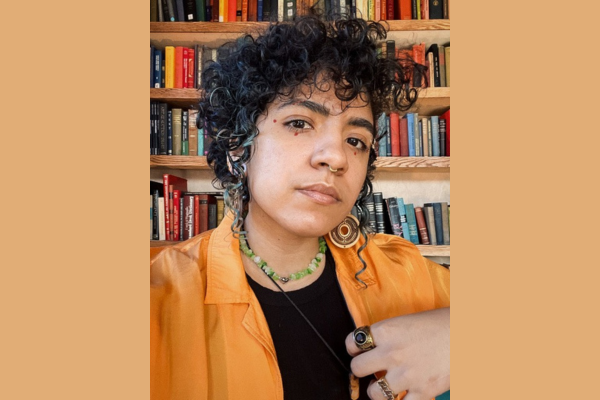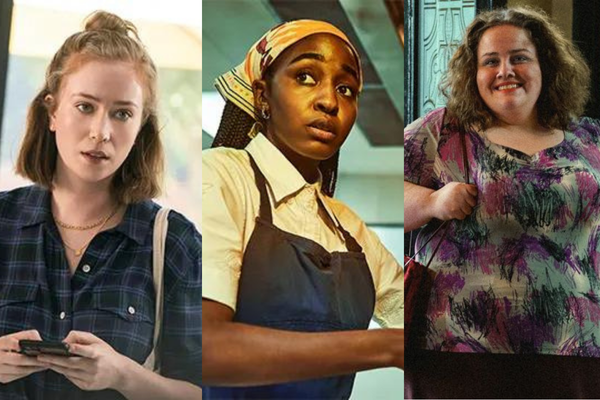
Exploring 70 Years of Lesbian Publications: From 1940s Zines to Modern Glossy Magazines
November 1, 2023
Combating Social Isolation with LGBTQ+ Elders at National and Local Levels
November 7, 2023Non-binary. Queer. Afro/Indigenous Dominican-American. New Yorker.
These are some of the identities of juliany taveras, who channels those parts of themselves into about as many forms of storytelling including plays, screenwriting, poetry, and graphic design.
Some of taveras’s identities and artistic proclivities were obvious from birth. Taveras was born in Brooklyn to Afro/Indigenous parents from the Dominican Republic, or Ayiti Bohio, as the island is called in their culture. They grew up in different areas surrounding New York City (part of Lenapehoking), and were drawn to creativity from an early age, first in the form of reading.
“I was always really nerdy and bookish,” says taveras. “[My mother] says I came out like that.”
Then, around age nine or 10, taveras realized their interest in and knack for writing stories. They explored poetry in high school, moved into playwrighting in college, and more recently, added screenwriting to their repertoire (along with dabbling in other art over the years).
Simultaneously with their creative journey, taveras came into their queerness.
“I always half-joke that I kind of knew when I was 12, then procrastinated [the acknowledgement] until I got to college, because…I just think my younger self knew it wasn’t gonna be a fun ride to try to tackle that, or it wasn’t gonna be safe,” says taveras, noting constraints of being from a Catholic, immigrant family.
taveras says writing offered an outlet for and/or escape from the angst of containing that part of themselves. However, much of what taveras wrote in their youth was driven not by their own identities, but by the norms of established entertainment. As such, Taveras says their characters were straight, white, thin, and other things taveras wasn’t.
“It really speaks to how much our imaginations are shaped by what’s in the dominant culture,” says taveras.
But through art, taveras began exploring more inward-based storytelling. A particular turning point came in college, when they learned about Chicana-Chinese playwright Virginia Grise’s play “blu.” taveras was surprised to discover a play that was a queer, epic, two-spirit Indigenous story, and realized that’s the kind of thing they wanted to create.
Ever since, that’s what taveras has done, centering their storytelling in themes of Afro/Indigenous and queer/trans diaspora—i.e., creating characters and stories that are informed by the histories of migration, displacement, imagination, and resistance of [Caribbean] Afro/Indigenous, and queer/trans people. taveras aims to write stories that grapple with these issues, and worlds where people of such lineages and identities do conversely feel safe and free.
Tackling that in the context of a children’s story, taveras penned a play that will have its world premiere at the Children’s Theatre Company in Minneapolis that runs through November 19. taveras adapted the play, “Morris Micklewhite and the Tangerine Dress,” from the same-named book. It’s about a boy who, after being made fun of for wearing his beloved tangerine dress—because “boys can’t wear dresses”—embarks on an imaginative journey to find out if astronauts wear dresses.
The play, which will also show in Chicago and Omaha, is taveras’s first commissioned play. But the storyteller has other non-stage projects in development. They recently adapted a picture book Julián is a Mermaid into an animated film (Julián) expected to be released in 2024 or 2025, and in relation to a 2021 writing deal with Amazon, taveras was working on a television adaptation of the book Felix Ever After—which is about a black trans teenager navigating identity, bullying, and other challenges while falling in love. The project was halted by the writer’s strike, but taveras hopes it will soon be restarted. They also hope “Morris Micklewhite” will eventually be staged at other theaters.
taveras doesn’t know what their future otherwise holds, as they say they’ve never been much of a planner. But, with a mind for using their imagination to expand others’ imaginations, they do plan to continue creating stories that reflect identities like theirs, to provide what they never saw growing up.
“We just have to keep our feet on the pedals and… demand to be seen and heard and represented, and connect with each other,” says taveras. “So that’s all I’m trying to do.”





